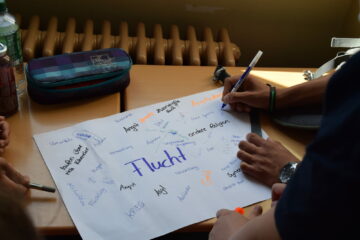The political education working group regularly conducts workshops and educational days at schools on the subject of flight and asylum. We obtain our materials from educational offers and institutions of political education, but also from state institutions such as the German Liaison Office of the European Parliament. The office has published role plays on five issues, including the topic “FREIZÜGIGKEIT – Grenzen schließen wegen Flüchtlingen?” (“Freedom of movement – closing borders because of refugees?”).
While going through the freely available material, we noticed some things that we see as incompatible with the educational work, which is supposed to contribute to a democratic formation of opinion far from generalizations and despising rhetoric. That is why we have formulated our points of criticism in an open letter to the liaison office, which we also publish here on our blog.
“Dear Sir or Madam,
As an association that deals with the topics of flight and migration and regularly organises workshops on this subject at schools and other educational institutions, we recently also discussed the role play “Freizügigkeit – Grenzen schließen wegen Flüchtlingen?” (“Freedom of movement – closing borders because of refugees?”), which is available for free download on the website of the German Liaison Office of the European Parliament.
We have noticed various points that we would like to elaborate on below in order to contribute in this way to a less polarizing and sweeping formation of opinion through such role plays.
First of all, we find it extremely difficult to offer a role-playing game that deals with such a complex topic without adequately informing the pupils* about the topic in advance. This requires more than two short introductory texts, which in our opinion, apart from their briefness, present the subject much too undifferentiated and simplified. In addition, terms are used that evoke strong emotional reactions and thus further reinforce the subjective impression of flight as a primarily European topic. Instead, the situation in Europe could have been placed in a global context, at least to some extent. Formulations like “thousands of them came every day […]” distort the political reality and already at the beginning of the role play provide for an early opinion formation of the participants*. The same applies to the general background information. Here it is confusing that Article 16a of the German Constitution is initially intended to grant unrestricted asylum, but then it is admitted that this does not apply to refugees who have entered directly from or via safe countries of origin as a result of the comprehensive third country regulation in Paragraph 2 f..
Also, extremely unfortunate is the – albeit unintentional – contextualisation of flight with crime with regard to the short-term reintroduction of border controls. Here, too, it seems as if the wording paid less attention to the framework of the role play and above all to a neutral mediation vis-à-vis the pupils than to the indiscriminate reproduction of information. Instead of explaining certain legal facts in a precise and comprehensible way, here too, apparently for the purpose of better illustration, generalisations are used that unnecessarily charge the subject with emotion. The impression is created that the way the content is conveyed and its effect on the pupils has not been sufficiently addressed.
This only intensifies even more with regard to the individual roles. The individual characters do not seem to have formed their opinions in an objective discussion of the subject, but rather from an emotional reaction that varies according to the role. What is striking here is that, despite their professional diversity, the roles correspond to simple patterns; regardless of whether they are homeowners, mayors or members of the European Parliament, they mostly correspond to social stereotypes such as “good people”, the “right-wing accoster” or the insecure mother who cares for her own children. There are no alternatives to these prejudices, which are already much too present in the public discourse on the subject anyway. This places the subject of flight even further into a merely emotional, unobjective context, which also allows the participants to articulate the assumed roles unreflectively in discussion without having to resort to facts. There is a danger that opinions and stereotypes that have already been formed will be strengthened in this way and that – instead of being critically questioned – they will only become more firmly entrenched in the minds of the pupils* or even be formed in the first place. The subsequent round of reflection is also unable to change this, as the discussion does not offer any added value.
In conclusion, it can be said that it can be doubted that the role play is conducive to a cosmopolitan, critical and comprehensive education of pupils*. In most cases, therefore, the discussion will not have a horizon-widening effect for any of the pupils* instead it will cause frustration and encapsulation in one’s own opinion. The question about the purpose of this role play is seriously raised; it does not seem to be a pluralistic imparting of knowledge with the aim of an open, objective and reflexive education.
The working group for political education for Rigardu e.V.”
Written by the working group for political education



0 Comments